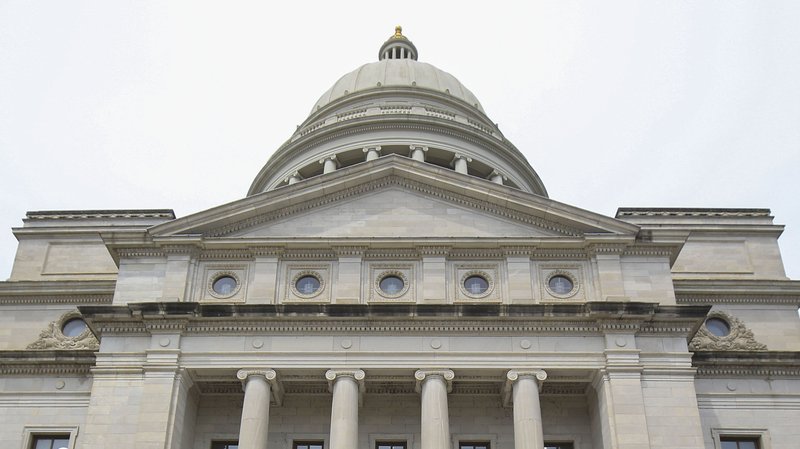A House panel on Tuesday endorsed a bill intended to allow a person injured by a "gender transition procedure" as a minor to sue the medical professional who performed the procedure.
Senate Bill 199, by Sen. Gary Stubblefield, R-Branch, passed the House Committee on Judiciary in a voice vote with audible dissent. The bill advances to the full House following the roughly 90-minute panel meeting.
Rep. Mary Bentley, R-Perryville, the bill's sponsor in the House, said the measure is needed to protect minors and would not bar health professionals from conducting procedures. She noted the legislation provides a "safe harbor" section that would provide health care professionals with a defense against legal action.
When presenting the bill, Bentley shared the story of Chloe Cole, a teenager who has said she regrets receiving transgender reassignment treatment and surgery. Cole has spoken in favor of legislation in other states that aims to limit transgender care.
Under Stubblefield's bill, a health care professional who performs a "gender transition procedure" is liable to the minor if the minor is "injured, including without limitation to any physical, psychological, emotional, or physiological injury, by the gender transition procedure, related treatment, or the after-effects of the gender transition procedure or related treatment."
Supporters and opponents who spoke on the bill disagreed over the results of studies regarding the impact of gender transition procedures on minors.
National medical organizations, including the American Medical Association, have objected to legislative restrictions on gender-affirming care, saying a majority of patients report improved mental health and lower suicide rates after receiving care.
Opponents said the bill would restrict access to important care for transgender people, especially those with mental illnesses. People who spoke against the bill related stories of people who have faced suicidal thoughts before receiving reversible gender-affirming care.
When asking questions on the bill, lawmakers noted the measure appears to make health professionals strictly liable for injuries caused by medical procedures rather than liable for negligence in providing standards of medical care.
"This would be new, I believe, in medical malpractice," said Rep. Andrew Collins, D-Little Rock, who is an attorney. "There's no mention of negligence, there's no mention of any kind of standard that would have to be breached."
Chief Deputy Attorney General Bob Brooks said standard of care is not codified in state law. To prove a medical negligence case, an expert witness would have to testify to the standard of care in Arkansas.
Brooks later said, however, the bill would allow claims "closer to a strict liability" than negligence.
Under the bill, a minor injured by a "gender transition procedure" or a representative for the minor could sue the health care professional who performed the procedure no later than 15 years after the minor turns 18 or would have turned 18 if the minor dies before turning 18.
The current statute of limitations for most medical malpractice cases in Arkansas is two years, according to state law.
The bill defines a "gender transition procedure" as a medical procedure intended to alter "or remove physical or anatomical characteristics or features that are typical for the individual's biological sex." The bill also addresses procedures that seek to instill "or create physiological or anatomical characteristics that resemble a sex different from the individual's biological sex."
Bentley raised concerns that clinics providing transition procedures were creating a "whole cohort of kids with atypical genitals."
When asked how common "gender transition procedures" are in Arkansas, Bentley said she could not say because of the confidentiality of medical records. Opponents said physicians in Arkansas are not offering irreversible gender-affirming surgeries.
Carter Kirby, an 18-year-old transgender youth, told lawmakers that legislation restricting medical treatment for transgender people endangers lives.
"The thing about this legislation is that it's an attempt to fear-monger, to make you catastrophize and assume the worst when it comes to transitioning," Kirby said.
Jerry Cox, president of the Family Council, spoke in favor of the bill, noting that physicians had supported legislative restrictions on transgender care when lawmakers passed the Save Adolescents From Experimentation Act in 2021.
The law, which outlaws gender-affirming health care for transgender children, was blocked by a judge and is awaiting a court ruling.
"I see this bill as something that slows down that rush to judgment to say the only thing we can do for that young person is to take drastic measures that may affect them for the rest of their life," Cox said.
People who spoke against the bill noted physicians also had testified against the SAFE Act.
Courtney Frierson, a social worker and accredited sex therapist, told lawmakers that puberty blockers, which medical professionals consider reversible, are generally not provided to minors younger than 10.
Frierson noted these drugs are commonly used to block precocious puberty in children. Standards of care provided by the World Professional Association for Transgender Health say a person must turn 18 before receiving surgeries or other irreversible gender-related care, she said.
The "safe harbor" section of the bill would, among other requirements, require health care professionals to document a minor's "perceived gender or perceived sex for two (2) continuous years" and receive the voluntary and informed consent of the minor and their parents before performing a procedure.
For minors who "suffered from a mental health concern," at least two health care professionals, including at least one mental health professional, would have to certify in writing that "the gender transition procedure was the only way to treat the mental health concern."
Rev. Marie Mainard O'Connell, who is the parent of a transgender child, objected to the bill, asking why the safe harbor section would require health care professionals to verify a child doesn't have other mental health conditions.
At least two professionals, including at least one mental health care professional, also would have to certify in writing that "the minor suffered from no other mental health concerns, including without limitation depression, eating disorders, autism, attention deficit hyperactivity disorder, intellectual disability, or psychotic disorders."
